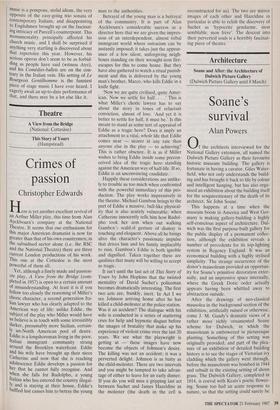Theatre
A View from the Bridge (National: Cottesloe) This Story of Yours (Hampstead)
Crimes of passion
Christopher Edwards
Here is yet another excellent revival of an Arthur Miller play, this time from Alan Ayckbourn's company at the National Theatre. It seems that our enthusiasm for this major American dramatist is now far greater than that of his own countrymen; in the subsidised sector alone (i.e. the RSC and the National Theatre) there are three current London productions of his work. This one at the Cottesloe is the most powerful of them all.
Yet, although a finely made and passion- ate play, A View from the Bridge (com- pleted in 1957) is open to a certain amount of misunderstanding. At least it is if you follow too closely the reasoning of Miller's choric character, a second generation Ita- lian lawyer who has clearly adapted to the American way of life: unlike Eddie, the subject of the play who Miller would have us believe is in touch with some irresistibly darker, presumably more Sicilian, certain- ly un-North American pool of desire. Eddie is a longshoreman living in the poor, Italian immigrant community strung around the Brooklyn waterfront. Eddie and his wife have brought up their niece Catherine and now that she is reaching adolescence Eddie develops a passion for her that he cannot fully recognise. And when she falls for Rudolpho, a young Italian who has entered the country illegal- ly and is staying at their house, Eddie's baffled lust causes him to betray the young
man to the authorities.
Betrayal of the young man is a betrayal of the community. It is part of Alan Ayckbourn's considerable success as a director here that we are given the impres- sion of an interdependent, almost tribal immigrant world where ostracism can be instantly imposed; it takes just the appear- ance of a few silent, unforgiving neigh- bours standing on their wrought-iron fire- escapes for this to come home. But they have also gathered to watch a ritual punish- ment and this is delivered by the young man's brother, Marco, who kills Eddie in a knife fight.
`Now we are quite civilised, quite Amer- ican. Now we settle for half. . . .' This is what Miller's choric lawyer has to say about the story in tones of reluctant conviction, almost of loss: 'And yet it is better to settle for half, it must be.' Is this meant to stand as some sort of appraisal of Eddie as a tragic hero? Does it imply an
attachment to a vital, whole life that Eddie
comes near — nearer at any rate than anyone else in the play — to achieving?
This is rather obscure. It is as if Miller wishes to bring Eddie inside some precon- ceived idea of the tragic hero standing against the American way of half-life. If so, Eddie is an unconvincing candidate.
Happily these considerations are unlike- ly to trouble us too much when confronted with the powerful immediacy of this pro- duction. The play works impressively in the theatre. Michael Gambon brings to the part of Eddie a massive, bull-like physical- ity that is also acutely vulnerable; when Catherine innocently tells him how Rudol- pho took her arm when out walking Gambon's scalded gesture of dismay is touching and eloquent. Above all he brings alive the character's passionate impulse that drives him and his family implacably to ruin. Gambon's Eddie is both ignoble and dignified. Taken together these are qualities that many will be willing to accept as tragic.
It isn't until the last act of This Story of Yours by John Hopkins that the twisted
mentality of David Suchet's policeman becomes dramatically interesting. The first two acts are, frankly, inert. In Act I we see Johnson arriving home after he has killed a child-molester at the police station. Was it an accident? The dialogue with his wife is conducted in a series of stuttering cries for help and hypnotic disgust before the images of brutality that make up his experience of violent crime over the last 20 years. We see what the playwright is getting at — these images have now become the objects of Johnson's desire.
The killing was not an accident; it was a perverted delight. Johnson is as batty as the child-molester. There are two intervals and you might be tempted to take advan- tage of either to leave for an early dinner.
If you do you will miss a gripping last act between Suchet and James Hazeldine as the molester (the death in the cell is reconstructed for us). The two are mirror images of each other and Hazeldine in particular is able to relish the discovery of Suchet as 'hypocrite gendarme, mon semblable, mon frere'. The descent into their perverted souls is a horribly fascinat- ing piece of theatre.


















































 Previous page
Previous page